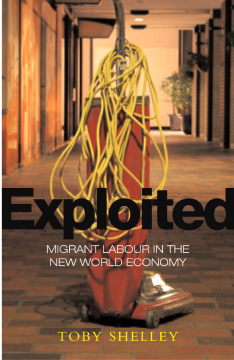
Additional Information
Book Details
Abstract
From cleaning to construction, from agriculture to domestic work, every day migrant labourers are exploited and enslaved. Extra hours are squeezed out of Polish food packers, and trafficked African children are used for forced labour. Low wages are used to drive down prices from the oil industry to airport services.
In this book, Toby Shelley shows that current unprecedented flows of migrant workers are a direct result of economic liberalization. The appalling conditions and legal abuses which confront these workers are not a premodern aberration, but an integral part of the global economy. Shelley argues that even governments, keen to protect big business, are complicit in this exploitation; their 'law and order' approach on immigration being part of this complicity.
Based on interviews and investigations with workers, unionists and activists, Exploited is a powerful and shocking read.
Toby Shelley is a journalist with the Financial Times. Over the past twenty years he has reported from across Africa and the Middle East. His previous books include Nanotechnology (2006), Oil (2005) and Endgame in the Western Sahara (2004). He is a member of the Council of Management of the radical development charity War on Want.
'...Toby Shelley presents a powerful legal and moral indictment against the governments and companies of the world in the exploitation of labour.'
Marcus Papadopoulos, Tribune.
'Shelley provides superb reporting and horrific anecdotes to describe the unfolding tragedy...Terse and angry, he reveals how time and time again, people jump through hoops of horror to live in lands that offer opportunity.'
Yale Global Online
'Shelley's impressive data and sustained argument make this book an important resource'
Phil Marfleet, International Socialism
Table of Contents
| Section Title | Page | Action | Price |
|---|---|---|---|
| Acknowledgements | vii | ||
| Introduction | 1 | ||
| 1 | 11 | ||
| Migration in Context | 11 | ||
| Stereotypes, myths and obsessions | 15 | ||
| Push and pull – why people migrate | 18 | ||
| The immortal worker | 24 | ||
| Migratory tides | 31 | ||
| 2 | 41 | ||
| Migrant Labour | 41 | ||
| The Food Industry | 43 | ||
| The gangmaster | 51 | ||
| Morecambe Bay | 57 | ||
| Exploited | 59 | ||
| Ernesto and Celinda | 62 | ||
| The Cleaning Industry | 65 | ||
| Construction | 72 | ||
| Structural labour shortage | 75 | ||
| The abuse of labour: from the Lump to Losc | 78 | ||
| Turning a blind eye | 82 | ||
| Land, Sea and Airports | 84 | ||
| In the galleys | 85 | ||
| North Sea labour crisis | 88 | ||
| Hospitality | 92 | ||
| Domestic Labour | 98 | ||
| Child slavery in suburbia | 105 | ||
| The Sex Industry | 108 | ||
| The flesh trade | 111 | ||
| Victim, but whose victim? | 116 | ||
| 3 | 121 | ||
| Impacts | 121 | ||
| Migrant labour and the economy | 123 | ||
| Employment and wage levels | 124 | ||
| Schools, health care and housing | 130 | ||
| The pillage of exporting countries | 133 | ||
| The challenge | 136 | ||
| 4 | 138 | ||
| Government Response and Responsibilities | 138 | ||
| Determination: colour coding migrant workers | 139 | ||
| Enforcement – arbitrary, costly, ineffective | 143 | ||
| Policing: rights come second | 149 | ||
| Conclusion | 155 | ||
| Notes | 162 | ||
| Introduction | 162 | ||
| Chapter 1 | 162 | ||
| Chapter 2 | 165 | ||
| Chapter 3 | 171 | ||
| Chapter 4 | 173 | ||
| Conclusion | 174 | ||
| Index | 175 |
